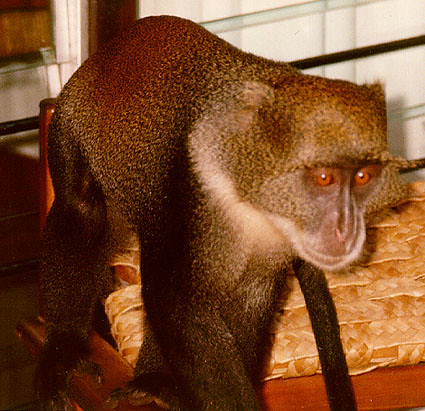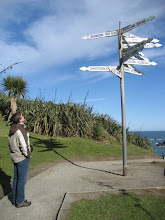
He turned to me as if to say, "Hurry, boy, it's waiting there for you."--Toto, "Africa"
Book Review
Alexandra Fuller went to Africa in 1972 with her British parents. Her memoir, Don't Let's Go to the Dogs Tonight tells of 1976 to 2001 in Zimbabwe (then Rhodesia), Malawi, and Zambia. She shares these childhood stories in a series of overlapping vignettes. She writes of her mother, "hard-living, glamorous, intemperate, intelligent, racist." (The book's title comes from A.P. Herbert's lines, "Don't let's go to the dogs tonight,/For mother will be there.") She writes of her father, "taciturn and capable." Most of all, she writes "a love story for the continent."Personal Memories
I went to Africa in March 2000 for the best vacation of my life. For a month I took photographs, mostly of wildlife, in Tanzania and Kenya. The best photographs are in an album, for reminiscing--or occasional sharing with guests, accompanied by narration. Some of these stories are already on the Web; some photographs and recollections are already in this blog; some I will start to share now.Africa came to my attention when a friend and his wife moved to Nairobi for a research assistantship abroad. I asked myself, When would I know someone in Africa? Thinking it unlikely to happen again, I decided to visit. (As it happens, my friend's family is again in Africa, and another old friend is there as well.) When I thought of Africa, I thought of Isak Denisen's Out of Africa, Ernest Hemingway's The Snows of Kilimanjaro, and safaris in the Serengeti. As I researched my trip, I discovered that east Africa (Nairobi in Kenya, Arusha in Tanzania, and Masai Mara or Serengeti in both) was the location for almost all of my associations.
I had taken chloroquine for my 1992 trip to Honduras, so I was familiar with antimalarial medication. Chloroquine had been the worst-tasting medicine I'd ever taken; I couldn't throw the pills down my throat fast enough to avoid the aftertaste. Mefloquine was the medicine for east Africa, with its chloroquine-resistant strains of plasmodium. It tasted better but produced vivid dreams. My waking imagination of what the parasite would do inside my body was vivid as well, so I took the antimalarial anyway.
Don't Let's Go to the Dogs Tonight opens with descriptions of bugs, and indeed insects were a concern as I prepared for my trip. I asked a friend who grew up in Africa about mosquito netting. What was the best kind? He didn't know; his family never used it. Did he worry about malaria? They just caught it, and got sick periodically. I decided I couldn't afford an absence from work for malaria when I returned.
One of my first nights in Arusha I awoke under the mosquito netting provided over the bed by the YMCA at which I was staying. What had disturbed my sleep was the high-pitched whine of a mosquito's wings. Fearing a proboscis through the tiny holes, I curled myself into a ball so none of my body touched the netting, and went back to sleep.
"I had a farm in Africa, at the foot of the Ngong Hills," I remembered, both from the movie, and from a British woman's reading of the book by Karen Blixen née Dinesen. (I heard Karen Blixen read another of her stories on tape as well.) In Nairobi, my friends lived in the neighborhood "Karen", and one day we visited that farm.
Bribery and graft have a place in most people's stories of Africa. For me it started before I was officially in Tanzania. The fee for the visa was $20. I handed the guard $50, which he placed in a machine that purported to check for forgery. The machine "broke" and the border guard wrote me a receipt for $20. I thought, "I guess I just paid $20 for a visa and $30 for a bribe." I never argue with border guards; after all, I wasn't yet in the country.
When I wanted a topographic map of Mount Kenya (I love maps), I found they were only available from a Kenyan national agency directly. When leaving their offices in Nairobi, the guard asked for "chai". My friend and I pretended not to know the meaning of this slang for bribe.
Every building in Nairobi had a guard. Every apartment building, every house, every shop had a guard. (There were plenty of people: a drought had brought many rural residents to the capital.) Almost no one called the police. Those who did told stories, repeated by my friends, of the police requesting money to handle the matter. While I was in Nairobi, the news reported that a man stole a mango. The bystanders and vendor chased him down and beat him to death. Corruption and vigilante justice have their price: a death penalty seems steep for theft. This, and the crumbling infrastructure, place Nairobi at the bottom of my list of the world's cities. (Paris, of course, is at the top.)
The drought affected both the human and the animal populations of east Africa. Another news story while I was there told of a fight that broke out between villagers and monkeys when a water truck arrived at the village.
I was briefly chased by a monkey myself. In Mombasa they are pests, attracted to the rubbish of Kenyan tourists. After safely reaching my hut, I took a picture through the sliding glass door of the Procolobus badius on the porch.
[Corrected author's name.]

1 comment:
There are currently four later posts with more stories of Africa.
Post a Comment